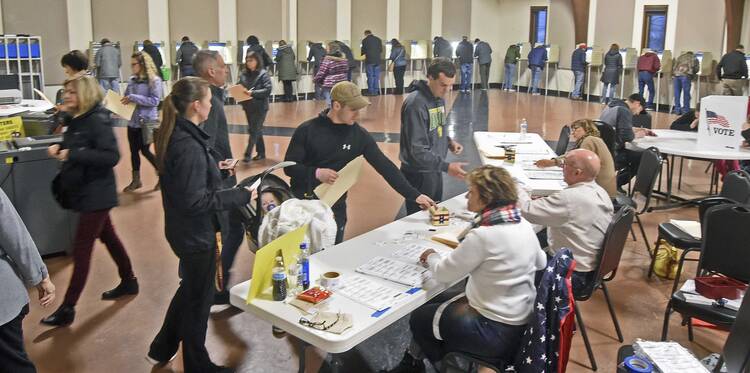WASHINGTON (AP) — President Donald Trump billed the midterms as an election about "Kavanaugh and the caravan," and it was — although not entirely as he planned.
Both the fight over Supreme Court nominee Brett Kavanaugh and the debate over immigration animated Republican base voters in states where the GOP made gains in the Senate. But they also cost his party in suburban races that decided the outcome of the House, contributing to the split-decision Trump received from voters.
Data gathered by AP VoteCast, a nationwide survey of more than 115,000 voters and about 22,000 nonvoters, suggests Trump's closing arguments about the courts and border security cost his party seats in the House.
A nationwide survey of more than 115,000 voters and about 22,000 nonvoters, suggests Trump's closing arguments about the courts and border security cost his party seats in the House.
Here's a snapshot of who voted and why from VoteCast, the survey conducted for The Associated Press by NORC at the University of Chicago.
KAVANAUGH
Ahead of Tuesday's election, both parties claimed the emotionally charged debate over sexual misconduct allegations against Kavanaugh would motivate their supporters to turn out. And it did.
Nationally, three-quarters of voters said the tumultuous battle was important to their vote, including 48 percent who said it was very important. Voters who considered it especially important broke for their Democratic House candidate, 56 percent to 43 percent.
But in key Senate races in the Republican-leaning states where Republicans flipped Democratic seats, those who ranked the debate as very important to their votes leaned toward the GOP. Voters who said the Kavanaugh hearings were very important broke for the Republican 60 percent to 40 percent in North Dakota, 56 percent to 42 percent in Indiana, and 53 percent to 44 percent in Missouri.
Kavanaugh faced multiple allegations of sexual misconduct from his youth, which he denied, and was confirmed by a GOP-controlled Congress following widely followed hearings.
The allegations against Kavanaugh were leveled roughly a year after the start of the #MeToo movement, which has brought national attention to sexual harassment and assault. Overall, 43 percent of voters said they were very concerned about women not being believed when they make allegations of sexual misconduct, and another 35 percent were somewhat concerned.
About as many said they were at least somewhat concerned about men not being given the opportunity to defend themselves against allegations of sexual misconduct.
While voters across most demographic groups considered Kavanaugh important as they cast ballots, there were wide differences in concern over the underlying issue.
While voters across most demographic groups considered Kavanaugh important as they cast ballots, there were wide differences in concern over the underlying issue.
Majorities of both men and women said they were at least somewhat concerned about women not being believed when they make allegations of sexual misconduct, but women were more likely than men to say they were very concerned about this, 52 percent to 35 percent.
Views varied widely by gender among Democrats, and just modestly among Republicans: Fully 74 percent of Democratic women said they were very concerned about women not being believed, compared with a smaller majority of Democratic men (56 percent). About a quarter of Republican women, and 2 in 10 Republican men, said they were very concerned about this.
While 55 percent of voters in urban areas said they were very concerned about women not being believed when they make allegations of sexual misconduct, 43 percent of suburbanites and 38 percent of voters in small towns and rural places said the same.
IMMIGRATION
In an indication of how the president's frightful rhetoric over migrant caravans marching toward the U.S.-Mexico border animated Republican base voters, immigration was top-of-mind for about 23 percent of voters, and they broke 78 percent to 20 percent for Republicans. Health care was named the most important issue facing the country by 26 percent of voters, and these voters broke for Democrats by similar margins (74 percent to 23 percent).
Voters overall were divided in their ratings of Trump on his handling of border security: 50 percent said they approve, while the same share disapprove.
Trump fared well on border security among voters in small towns and rural places — 6 in 10 approved, compared with 47 percent of suburban voters, who decided many key House races, and 36 percent of urban voters.
Fifty-seven percent of white voters expressed approval of the president on border security. White voters without a college degree were more likely than those with one to say they approved, 64 percent to 49 percent.








Kavenaugh probably. Caravan, who knows which way if at all. Poll shows that voters are clueless. People vote on unsubstantiated feelings produced by Agenda Journalism